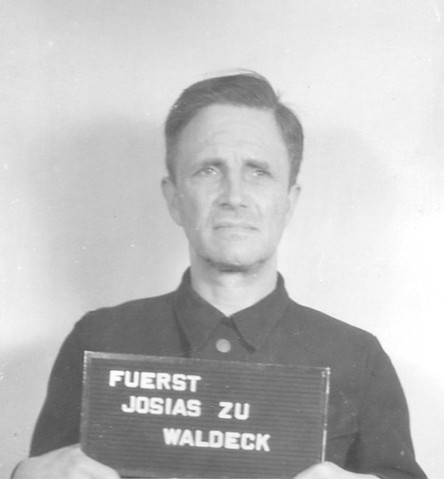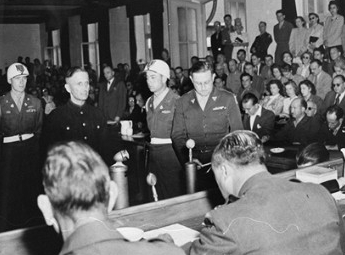by Susan Flantzer
© Unofficial Royalty 2023
The County of Waldeck was a county within the Holy Roman Empire since 1180. In 1625, the much smaller County of Pyrmont became part of the much larger County of Waldeck through inheritance and the combined territory was known as the County of Waldeck-Pyrmont. In 1712, Friedrich Anton Ulrich, Count of Waldeck-Pyrmont was elevated to Prince of Waldeck-Pyrmont by Holy Emperor Karl VI.
Friedrich, the last Prince of Waldeck-Pyrmont, was the brother of Marie, the first wife of King Wilhelm II of Württemberg, Emma who married King Willem III of the Netherlands, and Helena, the wife of Queen Victoria’s hemophiliac son Prince Leopold, Duke of Albany and the mother of Charles Edward, Duke of Saxe-Coburg and Gotha. Friedrich abdicated on November 13, 1918, and negotiated an agreement with the government that gave him and his descendants the ownership of the family home Arolsen Castle and Arolsen Forest. Today the territory that encompassed the Principality of Waldeck-Pyrmont is located in the German states of Hesse and Lower Saxony
********************

Josias, Prince of Waldeck and Pyrmont; Credit – By Bundesarchiv, Bild 146-1969-041-62 / CC-BY-SA, CC BY-SA 3.0 de, https://commons.wikimedia.org/w/index.php?curid=5482509
Josias, Prince of Waldeck and Pyrmont was the last heir apparent to the throne of the Principality of Waldeck and Pyrmont, Head of the Princely House of Waldeck and Pyrmont from 1946 until his death in 1967, and a convicted Nazi war criminal. Josias Georg Wilhelm Adolf was born on May 13, 1896, at Arolsen Castle in Arolsen, then in the Principality of Waldeck and Pyrmont, now in the German state of Hesse. He was the eldest of the four children and the eldest of the three sons of Friedrich, the last reigning Prince of Waldeck-Pyrmont and Princess Bathildis of Schaumburg-Lippe. Josias’ paternal grandparents were Georg Viktor, Prince of Waldeck and Pyrmont and his first wife Princess Helena of Nassau. His maternal grandparents were Prince Wilhelm of Schaumburg-Lippe and Princess Bathildis of Anhalt-Dessau. Through his father, Josias was the first cousin of Queen Wilhelmina of the Netherlands and two grandchildren of Queen Victoria, Charles Edward, the last reigning Prince of Saxe-Coburg and Gotha and his sister Princess Alice of Albany, Countess of Athlone.
Josias had three younger siblings:
- Prince Maximilian of Waldeck-Pyrmont (1898 – 1981), married Countess Gustava von Platen Hallermund, had three children
- Princess Helena of Waldeck-Pyrmont (1899 – 1948), married Nikolaus, Hereditary Grand Duke of Oldenburg, had nine children
- Georg Wilhelm of Waldeck-Pyrmont (1902 – 1971), married Countess Ingeborg von Platen Hallermund, had five children
Beginning in 1902, Josias was educated by private tutors. In 1912, he began to attend the Royal Wilhelms-Gymnasium (link in German) in Kassel, then in the Kingdom of Prussia, now in the German state of Hesse. In 1914, 18-year-old Josias passed the Notabitur (link in German), which replaced the usual Abitur, exams taken for a high school diploma, for students in the final years of high school who wanted to serve in the German Army during World War I.
When World War I broke out, Josias enlisted in the German army and was wounded several times, including a grazing shot to his head. After the defeat of the German Empire in World War I and the end of all the German monarchies, Josias’ father Friedrich, Prince of Waldeck-Pyrmont abdicated on November 13, 1918. He was the only German prince who refused to sign an abdication agreement. However, Friedrich did negotiate an agreement with the new government that gave him and his descendants the ownership of the family home Arolsen Castle and the Arolsen Forest.
On August 25, 1922, at Rastede Palace in Rastede, in Lower Saxony, Germany, Josias married Duchess Altburg of Oldenburg, the daughter of Friedrich August II, the last reigning Grand Duke of Oldenburg, and his second wife Duchess Elisabeth Alexandrine of Mecklenburg-Schwerin.
Josias and Altburg had four daughters and one son. Adolf Hitler and Heinrich Himmler, the two most powerful Nazis, were among the godparents of their only son Wittekind.
- Princess Margarethe of Waldeck and Pyrmont (1923 – 2003), married Franz II, Count of Erbach-Erbach von Warthenberg-Roth, had two children, divorced in 1979
- Princess Alexandra of Waldeck and Pyrmont (1924 – 2009), married Botho, Prince of Bentheim and Steinfurt, had two children
- Princess Ingrid of Waldeck and Pyrmont (1931 – ), unmarried
- Prince Wittekind, Head of the Princely House of Waldeck and Pyrmont (born 1936), married, Cecilia Countess Goëß-Saurau, had three sons
- Princess Guda of Waldeck and Pyrmont (born 1939), married Friedrich Wilhelm, Prince of Wied, had two children, divorced in 1962

Josias, with the rank of an SS-Obergruppenführer; Credit – By Franz Langhammer – Retrieved from germanianternational.com, Public Domain, https://commons.wikimedia.org/w/index.php?curid=11725055
Josias’ parents both lived through World War II but neither joined the Nazi Party. However, their eldest son Josias, his wife Altburg, and their eldest child Margarethe were members of the Nazi Party. Josias joined the Nazi Party in 1929 and by 1930, he was a member of the Schutzstaffel, better known as the SS. The SS was the primary agency of security, surveillance, and terror in Nazi Germany and German-occupied Europe. In September 1930, Josias became the Adjutant and Staff Chief of Heinrich Himmler, the head of the SS, one of the most powerful men in Nazi Germany, and the main architect of The Holocaust. In 1933, Josias was promoted to the rank of SS Lieutenant General. He was promoted again in 1938, to the Higher SS and Police Leader for Weimar. In this position, he had supervisory authority over the Buchenwald concentration camp. His final rank was SS- Obergruppenführer, the highest commissioned SS rank and General of Waffen-SS. Members of the Waffen-SS were involved in numerous atrocities. At the Nuremberg Trials (1945 – 1946), the Waffen-SS was judged to be a criminal organization because of its direct involvement in numerous war crimes and crimes against humanity.
Toward the end of World War II, Josias oversaw the efforts to conceal the horrors of the Buchenwald concentration camp by sending off inmates, resulting in thousands of deaths. Some inmates were sent on forced marches. Others were put in sealed trains for days. On one train trip that was supposed to last eighteen hours, only 300 of the 3,105 on the train survived the poor conditions, after days without any provisions for food or sanitation.

Josias; mug shot after being arrested; Credit – By unknown soldier or employee of the U.S. Army Signal Corps – Stiftung Gedenkstätten Buchenwald und Mittelbau-Dora, Public Domain, https://commons.wikimedia.org/w/index.php?curid=4783531
Josias was captured by American General George Patton’s forces at the Buchenwald concentration camp on April 13, 1945, the day the camp was liberated. While he was in custody, Josias learned of the death of his father on May 26, 1946. Josias was now the Head of the Princely House of Waldeck and Pyrmont and began to use the title Prince of Waldeck and Pyrmont but Josias would soon face two trials during the post-war period.

Josias in black facing the judges as a defendant at the Buchenwald Trial in 1947; Credit – Wikipedia
The Buchenwald Trial or United States of America vs. Josias Prince of Waldeck et al was a war crime trial conducted by the United States Army from April 11 to August 14, 1947, at the internment camp for war criminals, the SS and important witnesses in Dachau, Germany at the site of the former Dachau concentration camp. Thirty-one people, including Josias and many of the doctors responsible for Nazi human experimentation, were indicted for war crimes related to the Buchenwald concentration camp and its satellite camps, and all thirty-one defendants were convicted. On August 14, 1947, Josias was convicted and sentenced to life imprisonment and was sent to Landsberg War Criminal Prison Nr. 1 in Landsberg am Lech, Bavaria, Germany.
On September 17, 1949, a denazification appeals court classified Josias as a Level 2 – Offender: Activist, Militant, or Profiteer, on the five-tier scale of the denazification system, with Level 1, Main Offender, being the worst. As a result, 70% of his property was seized along with other sanctions and fines.
On November 29, 1950, after serving just three years in prison, Josias was released. He was among the first to benefit from US High Commissioner for Germany John J. McCloy’s amnesty program. At the strong urging of the West German government, and under pressure from the West German people, McCloy approved recommendations for the commutation of sentences of some Nazi criminals. In 1953, Josias received an amnesty from Georg-August Zinn, Minister President of Hesse reducing his fine from the denazification appeals court by more than half of the original fine.

Schaumberg Castle where Josias spent his final years; Credit – By Carsten Steger – Own work, CC BY-SA 4.0, https://commons.wikimedia.org/w/index.php?curid=122795425
Josias, Prince of Waldeck and Pyrmont spent the last years of his life in seclusion at Schaumburg Castle near Limburg an der Lahn in the German state of Rhineland-Palatinate. He was investigated in the late 1950s and early 1960s in connection to atrocities at the Buchenwald concertation camp, the war-time murder of civilian workers, and the Röhm Purge of 1934, a series of political executions without trials intended to consolidate Hitler’s power. However, most investigations were discontinued because the statute of limitations had expired or guilt could not be proven.

Waldeck-Pyrmont Princely Mausoleum and Cemetery; Credit – www.findagrave.com
Josias, Prince of Waldeck and Pyrmont died, aged, 71, on November 30, 1967, at Schaumburg Castle, and was buried in the Princely Cemetery at Schloss Rhoden (link in German), the burial site of the Waldeck-Pyrmont family in Rhoden, now in the German state of Hesse. He was succeeded as Head of the Princely House of Waldeck and Pyrmont by his only son Prince Wittekind. Josias’ wife Altburg survived him by 34 years, dying on June 16, 2001, aged 98. She was buried with her husband in the Princely Cemetery at Schloss Rhoden.
This article is the intellectual property of Unofficial Royalty and is NOT TO BE COPIED, EDITED, OR POSTED IN ANY FORM ON ANOTHER WEBSITE under any circumstances. It is permissible to use a link that directs to Unofficial Royalty.
Works Cited
- Flantzer, Susan. (2021). Friedrich, Prince of Waldeck-Pyrmont. Unofficial Royalty. https://www.unofficialroyalty.com/friedrich-prince-of-waldeck-pyrmont/
- Petropoulos, Jonathan. (2009). Royals and the Reich. Oxford University Press.
- Wikimedia Foundation. (2023). Buchenwald Trial. Wikipedia. https://en.wikipedia.org/wiki/Buchenwald_trial
- Wikimedia Foundation. (2023). Josias zu Waldeck und Pyrmont. German Wikipedia. https://de.wikipedia.org/wiki/Josias_zu_Waldeck_und_Pyrmont
- Wikimedia Foundation. (2023). Josias, Hereditary Prince of Waldeck and Pyrmont. Wikipedia. https://en.wikipedia.org/wiki/Josias,_Hereditary_Prince_of_Waldeck_and_Pyrmont
